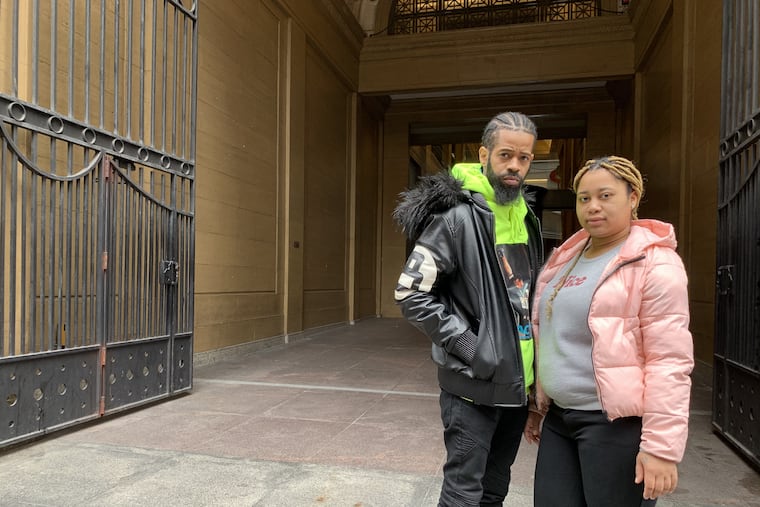Amid coronavirus fears, Philadelphia City Council considers pressuring for an end to evictions, foreclosures, utility shutoffs
“We believe housing is a human right, and no one should make a choice between their safety, health, and having to keep a roof over their heads,” Councilmember Helen Gym said.

A Philadelphia City Council proposal calls for a temporary moratorium on evictions, foreclosures, and tax-lien sales so that people won’t lose their homes if the coronavirus or the economic effects of the outbreak cause them to lose income.
The resolution, introduced Thursday by Councilmembers Helen Gym and Kendra Brooks, also asks for a moratorium on utility shutoffs for those who can’t keep up with their bills amid the crisis.
“We believe housing is a human right, and no one should make a choice between their safety, health, and having to keep a roof over their heads,” Gym said during the Council meeting.
Council does not have the power to stop evictions, foreclosures, or efforts to collect delinquent taxes on residences — or to order utilities to pause service cutoffs. The Councilmembers hope that the resolution can spark discussion and pressure the courts and utilities to consider such measures.
It appeared to have one early payoff, as the Philadelphia Water Department on Thursday announced a 60-day moratorium on service shutoffs.
Another resolution introduced Thursday by Brooks would call for employers to continue health and paid time off benefits for workers and set aside city funds for emergency cash grants, among other strategies.
Council is expected to vote on both resolutions next week.
» READ MORE: In one chaotic courtroom, free counselors and attorneys have saved 11,000 Philly homes from foreclosure
The Sheriff’s Office, which is responsible for the sale of foreclosed homes, welcomed the resolution.
“The Sheriff’s Office supports a thoughtful exploration of this moratorium as it is clear the potential hardship posed to our residents would be severe to those who are already in the midst of one of life’s most traumatic moments — losing their homes,” Sheriff Rochelle Bilal said in a statement Thursday.
The First Judicial District of Philadelphia, responsible for court hearings related to foreclosures and evictions, does not have plans to end hearings, but is discussing how to respond to the virus.
“It’s on our radar in regards to this and criminal division,” said Gabe Roberts, a spokesperson for the court.
About two dozen people waited Thursday afternoon in eviction court on Chestnut Street, a collection of tenants, landlords, and lawyers wrangling over whether people would keep their homes. Andrew Seawright, 34, and Senitra Bundy, 24, were fighting a claim that they owed $8,000 in unpaid rent. They won, they said, but Seawright said he could be particularly vulnerable to eviction if coronavirus costs him work. The two have three children, but have not lived together since an eviction in February.
Seawright rents a place in North Philadelphia with two roommates and works at Nordstrom Rack at 17th and Chestnut Streets, where he’s concerned he could be exposed to the coronavirus.
“People go from the hospital and shop at Nordstrom’s,” he said.
He has few other options. An eviction moratorium “would definitely be a comfort,” he said.
Another group at the hearings — landlords — said an eviction moratorium would unfairly take money out of their pockets.
“It would affect a lot,” said Steven Taing, who owns 10 rowhouses in North Philadelphia.
The proposed resolution does not contain language protecting property owners, but a spokesperson for Gym said she would not oppose that.
A mandatory winter moratorium on water service shutoffs would have ended April 1, but will be extended for 60 days under the Water Department’s announcement.
Municipal governments in San Jose and San Francisco already have passed laws to hinder evictions caused by coronavirus-related illness or sudden income loss.
In Philadelphia, utilities are restricted by state regulations from cutting services to low-income people during winter months.
PECO was noncommittal about suspending power shutoffs for nonpayment.
“We are closely monitoring developments related to the coronavirus and taking appropriate precautions,” the company said in a statement.
PGW did not respond to requests for comment.
People with low salaries or who depend on hourly wages have little ability to weather an extended downturn, housing advocates said. As coronavirus leads to shutdowns at schools and even the suspension of the NBA season, more people face the prospect of losing income for weeks or months.
“Those folks are going to be put at risk of eviction if their jobs and hourly wages dry up as a result of this virus,” said George Donnelly, a lawyer with the Public Interest Law Center.
» READ MORE: Rent control and homeowner protections urged for Philadelphia amid gentrification
“It’s a powerful message from City Council that we don’t want to make the pandemic worse by threatening homelessness for hundreds of low-income owners and renters,” said Mike Froehlich, of Community Legal Services.
About 20,000 evictions are filed in Philadelphia each year, the fourth-highest number among American cities. An average of 325 residential mortgage foreclosure lawsuits are filed in Philly each month, and an additional 330 tax foreclosures.
A moratorium could range from reviewing individual cases to a wholesale shutdown of eviction and foreclosure hearings, Froehlich said. Foreclosures could be stopped either in court or with an end to sheriff sales. Another option would be to give a homeowner a 12-month reprieve from mortgage payments and rearrange the loan so that amount can be repaid at the end of the mortgage.
With the city issuing recommendations against large gatherings, even holding court hearings has come under scrutiny.
Said Donnelly: “Asking large numbers of Philadelphians to attend eviction court, a place where dozens if not hundreds of people sit in close quarters with one another, does not seem like a great public health idea at this point.”